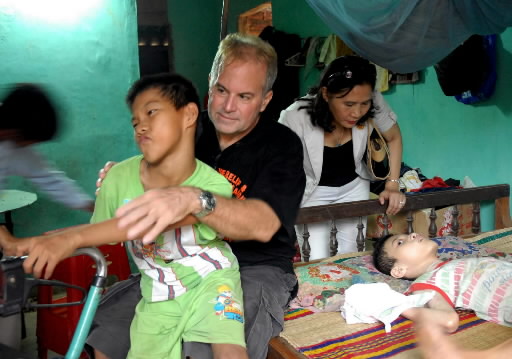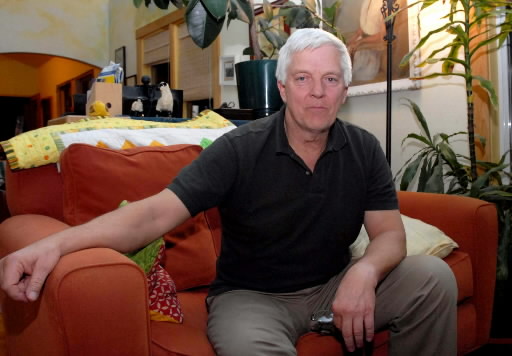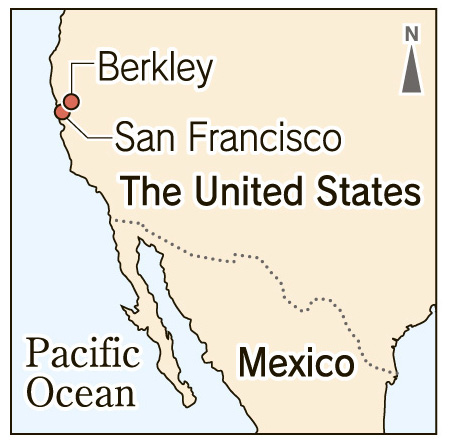Vietnam: 50 years after the use of defoliants, Part 2: Both victimizer and victim, Article 2
Jul. 24, 2012
Article 2: Suffering of veterans: U.S.
Health problems and heavy responsibility
by Takamasa Kyoren, Staff Writer
Inability to clarify facts through lawsuit
Seated on the sofa at his home in Berkeley, California, Paul Cox, 63, expressed regret for believing what then U.S. President Lyndon Johnson said about saving the people of South Vietnam and then going off to war.
As the glow of sunset tinted the potted plants near the window, he recalled that within a few months of arriving in Vietnam he realized it was not a “just war.”
Mr. Cox went to Vietnam in February 1969 and spent a year and a half there. He was stationed in the vicinity of the demilitarized zone that divided North and South Vietnam and in Da Nang in central Vietnam, which served as a base for defoliation operations. After returning home from Vietnam, Mr. Cox developed thyroid disease.
Some studies have said that the highly toxic dioxin in the defoliants causes thyroid and other endocrine disorders. But the compensation offered by the U.S. government for health problems does not cover thyroid disorders. Mr. Cox’s condition was cured for the most part by radiation treatment, but he must continue to take medication.
Memories that do not fade
His memories of the war have not faded. In order to find guerrillas hiding out in the villages of Da Nang, his unit forced residents to relocate, and some of them killed unarmed villagers. He closed his eyes and was silent for a moment before saying that they bore a great responsibility for what they did in the war.
Ben Quick, 37, a resident of Arizona, traced the life of his father, a veteran who died three years ago. In 1970 he was stationed in the jungles along the border of Vietnam and Cambodia. The area served as a base for the National Front for the Liberation of South Vietnam (Viet Cong) and was heavily sprayed with defoliants, scorching the battlefields. Mr. Quick’s father drank river water while taking part in various battles in the area.
Mr. Quick was born three years after his father returned from Vietnam. He suffers from disabilities in both of his arms. He described his father’s feelings, saying that he bore burdens of guilt both for having fought in Vietnam, which he should have been proud of, and for his son’s disabilities.
A class-action suit seeking compensation for damages was filed by Vietnam veterans against the chemical companies that manufactured the defoliants. In 1984 the chemical companies paid $180 million to settle the suit. The maximum share was approximately $3,000 (equivalent to about 720,000 yen at that time). The veterans and their families had hoped to would clarify the facts regarding defoliants in court, but those hopes were dashed. Some of the plaintiffs filed lawsuits to express their dissatisfaction with the settlement, but all of them were dismissed.
Visits to facilities, assistance provided
Two weeks after visiting the home of Mr. Cox, I saw him at a support facility for disabled children in Da Nang. He was there with nine other members of a nationwide organization called Veterans for Peace. The group traveled to eight cities over 15 days, visiting victims of defoliants at facilities and in their homes and providing financial assistance.
The leader of the group, Chuck Palazzo, 59, a resident of Vietnam, said the members were considering what they could to help the victims of defoliants in that country. Doan Hong Chuong, vice president of the Da Nang Association for Victims of Agent Orange/Dioxin, said, “I would like them to lobby the U.S. government to provide support for the victims.”
Mr. Palazzo said most of the group’s members were concerned about issues such as families who receive no medical care or financial support and areas that are still contaminated by residual dioxin and that they would take action to assist Vietnam after returning to their homes in the U.S.
This was Mr. Cox’s third trip to Vietnam since the war. He said that in order to avoid creating more suffering or sadness, he must face up to the past and assume responsibility for what he did in Vietnam.
Similar suffering has been experienced by veterans in far-off South Korea.
(Originally published on July 4, 2012)










